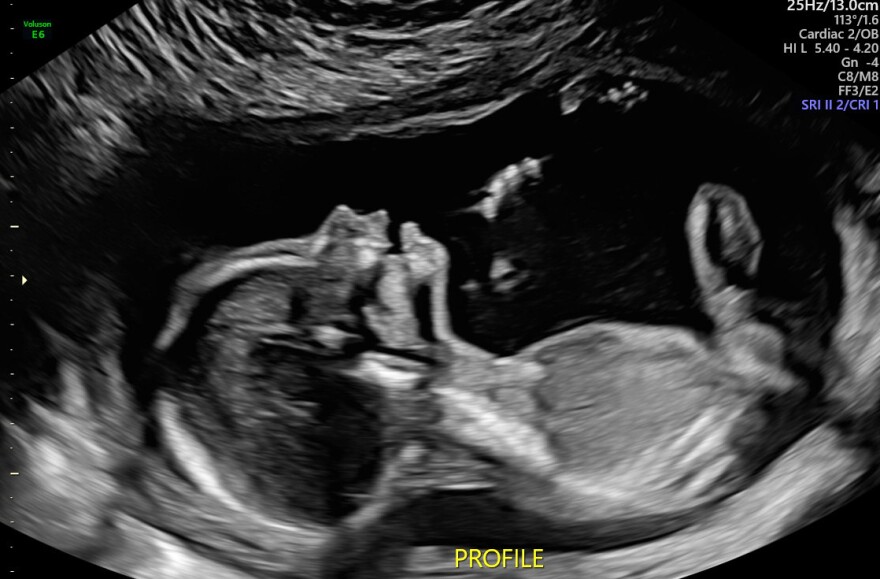
It’s late August, and my wife Emily and I are at the hospital to have an ultrasound of our baby. It’s an18-week anatomy scan to be specific — we’ll soon learn their sex.
Our ultrasound tech is scanning along Emily’s belly, the grainy monochromatic image swimming into view.
“So what do you guys think, boy or girl,” she asked us, pausing the ultrasound at the moment of truth. Emily ventured a guess based on the image — a girl. She was correct. High fives were exchanged because we had been kind of hoping for a girl all along.
We’re lucky — this hospital with a maternal care facility is right outside of town. But there are many rural residents whose clinic might be more than an hour drive.
By the end of 2023, 25 maternal care facilities closed across Indiana. These are hospital units with staff dedicated to the care of expectant mothers and their children and delivering babies.
In this climate such services are very important. In mid November, they traveled to the Perry County Memorial Hospital in Tell City.
Ashley Herr with the sim team is setting the scene for a birth simulation, for a group of nurses and EMTs who for the most part have never delivered a baby before.
“We're just gonna jump in,” Herr said. “This is your patient. 33 year-old. She presents to the ER, her husband brought her, she was trying to get to (a facility) But she said ‘I can't make it.’ So she pulled in here …”
The group of EMTs and nurses surround the “subject” – a set of manikin hips covered by a sheet in a conference room of the hospital. They are to act as if this was a real situation in their emergency department and work with what they have.
Herr gives more details — “This is her fifth baby … her water’s broken – It was clear fluid; there’s one baby in there – and she comes into your ED door.”
Registered Nurse Bev Wilson takes on delivering a mannikin baby from a mannikin mother.
The sim team is reminding them that a doctor’s help might not be coming, and it could be up to them alone.
“So what if your doc’s busy with that heart attack that's right down the hall?” Herr asked.
Taylor Faurbach is Perinatal Center Program Coordinator with Deaconess. “Patients are going to show up no matter what, because it's still a hospital,” she said. “And so we like for people to be prepared in the best way possible for that.”
She said today, the sim team is teaching about "precipitous delivery," where the baby is coming right away.

At the simulation, Wilson handles the slippery mannikin baby and she tries to figure out what’s next.
“I've never birthed one,” she said. “I mean so it's obviously coming out …”
After delivery, the waiting EMT’s help clear the mannikin’s airway.
“So really, in Indiana, it's actually surprising that we have one of the worst maternal and infant mortalities in the United States,” Faurbach said.
“And so what we're trying to do is we're trying to better prepare people for those emergencies, so we can help make healthier moms and babies.”
She said babies are still dying from preventable causes, and mothers have complications and existing health issues.
“So our group actually traveled all the way up towards the Terre Haute region in Indiana. And we actually spread all the way over towards the Louisville region. We also simulate in the tri state, so we go into Illinois, and we also go into Kentucky. So we have a pretty big spread right now what we do.”
And recently, this simulation team has become even more important to Tell City patients and beyond.
Perry Memorial officially lost their OB clinic and staff this month, and it’s happening across the state.
Faurbach said 25 closed across Indiana by the end of 2023. In part, it has something to do with the Dobbs decision.
“It's really hard to recruit providers right now with the current laws that are in place from Roe v Wade being turned over,” she said. “So this, unfortunately, is going to become an OB desert, meaning there's no OB care here in this county.”
Despite lack of dedicated staff, Perry County will continue to be a critical access hospital.
“That's why it's still important that their staff know how to take care of a mom and a baby in case they do come in,” Faurbach said.
This is part one of a two-part story. We’ll get more into how the Dobbs decision may have an unintended consequence on maternal and infant care, and how this sim team has changed practices at Perry County Memorial Hospital.
Support independent journalism today. You rely on WNIN to stay informed, and we depend on you to make our work possible. Give to grow our local reporting today. Donate now

